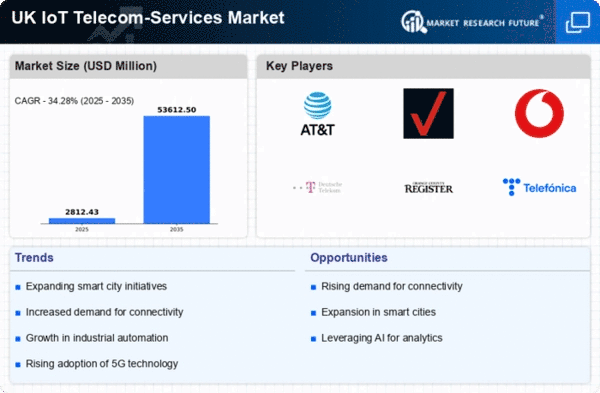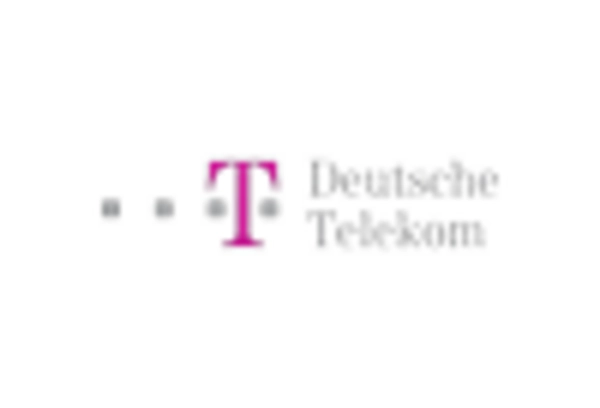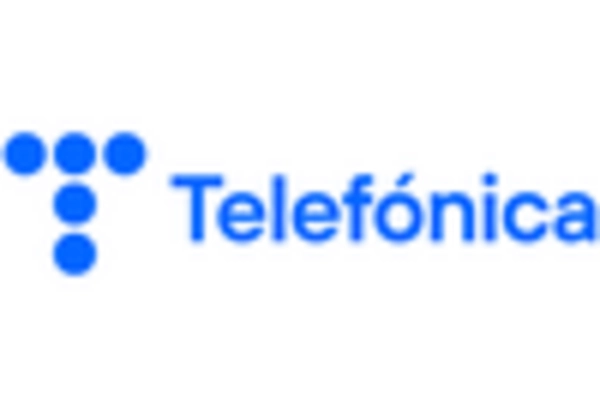Rise in Industrial IoT Adoption
The industrial sector in the UK is witnessing a significant shift towards the adoption of IoT technologies, which is likely to drive the iot telecom-services market. Industries such as manufacturing, logistics, and agriculture are increasingly leveraging IoT for process automation, predictive maintenance, and supply chain optimization. According to recent estimates, the industrial IoT market in the UK is expected to grow at a CAGR of 25% over the next five years. This growth is indicative of a broader trend where businesses seek to enhance operational efficiency and reduce costs through IoT solutions, thereby creating a substantial demand for telecom services that can support these innovations.
Increased Focus on Sustainability
The growing emphasis on sustainability within the UK is emerging as a crucial driver for the iot telecom-services market. Companies are increasingly adopting IoT solutions to monitor and reduce their carbon footprints, optimize resource usage, and enhance energy efficiency. For instance, IoT-enabled smart meters and energy management systems are becoming commonplace in various sectors. This shift not only aligns with governmental sustainability goals but also appeals to environmentally conscious consumers. As businesses strive to meet these sustainability targets, the demand for telecom services that facilitate IoT connectivity is expected to rise, thereby positively impacting the iot telecom-services market.
Expansion of Smart City Initiatives
The ongoing development of smart city initiatives in the UK appears to be a pivotal driver for the IoT telecom-services market.. Local governments are increasingly investing in infrastructure that supports IoT applications, such as smart lighting, waste management, and traffic monitoring. This investment is projected to reach £1.5 billion by 2025, indicating a robust growth trajectory. The integration of IoT solutions into urban planning not only enhances operational efficiency but also improves the quality of life for residents. As cities become more interconnected, the demand for reliable telecom services to support these applications is likely to surge, thereby propelling the iot telecom-services market forward.
Advancements in Network Technologies
The rapid advancements in network technologies, particularly the rollout of 5G, are likely to serve as a significant catalyst for the IoT telecom-services market.. The enhanced speed, lower latency, and increased capacity of 5G networks enable a broader range of IoT applications, from autonomous vehicles to remote healthcare solutions. The UK government has committed to investing £1 billion in 5G infrastructure, which is anticipated to bolster the telecom services sector. As businesses and consumers alike begin to harness the capabilities of 5G, the demand for IoT connectivity solutions is expected to escalate, further driving growth in the iot telecom-services market.
Growing Consumer Demand for Smart Devices
The increasing consumer demand for smart devices is emerging as a key driver for the IoT telecom-services market.. As households adopt smart home technologies, such as smart thermostats, security systems, and connected appliances, the need for robust telecom services to support these devices becomes paramount. Recent surveys indicate that over 50% of UK households are expected to own at least one smart device by 2026. This trend not only reflects changing consumer preferences but also highlights the necessity for reliable connectivity solutions. Consequently, telecom service providers are likely to expand their offerings to cater to this burgeoning market, thereby fostering growth in the iot telecom-services market.
















